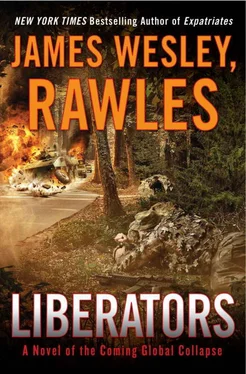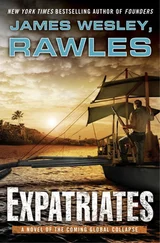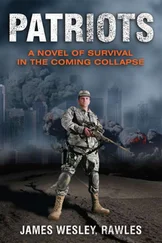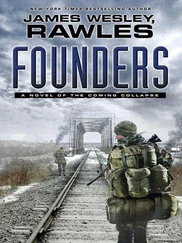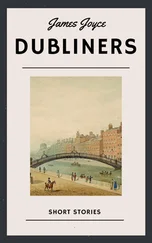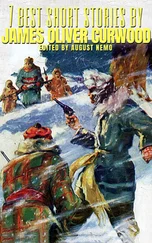The next fifteen minutes were very tense, and Megan showed it on her countenance. Two of the three men who led Joshua out of sight rejoined the rest of the men at the checkpoint; no one seemed to be giving away anything by their conduct about what could be happening on the other side of the lumber truck.
What Malorie and Megan couldn’t have known was that Joshua was being a very cool customer. When approached by the three men with guns, Joshua said, “My family and I in that Jeep request safe passage through your town to Route 10 South. We’re on our way to see my brother in Kentucky. May I speak with whomever is in charge?”
The middle-aged, stocky man in a flannel shirt with a vinyl puffy vest zipped halfway up said, “Right this way.” He reached out to grab Joshua’s right arm to escort him behind the truck after noticing Joshua’s pistol, keeping one hand on his rifle the whole time.
Joshua glanced at the truck, and other than the name of the lumberyard on the door, the GVWR, and the DOT number, he saw only a small vinyl graphic indicating a local chapter of the Knights of Columbus affiliation. Behind the truck he could see a small vendor’s pop-up tent with three walls flapping in the breeze with the words KETTLE CORN written across the awning. Inside, a small group of older men stood around a kerosene heater trying to keep warm while a pair of Coleman camping lanterns illuminated the makeshift command post. Against the back wall was a table with a police scanner and a ham radio set being operated by an overweight woman. The man who had Joshua’s arm addressed one of the men in the tent. “Mayor Simons, this officer approached the checkpoint and asked to speak with you.”
The mayor was wearing a long tan wool coat with a crucifix pin on the lapel, earmuffs, and a plaid scarf. He was stamping his feet to keep warm and around the outside of his coat on his waist was a thick leather belt and a full-flap cavalry-style holster with what appeared to be a large-frame Ruger Blackhawk revolver inside. The mayor removed his right mitten, tucked it under his left arm, extended his hand, and said, “Mayor Lamar Simons. What brings you to West Hamlin today?”
“Mayor Simons, my family and I request safe passage through your town to take the junction south on Route 10. Sir, we are coming from Kearneysville, West Virginia, on our way to Kentucky to see my brother.”
The mayor was distracted by an update from a fireman holding a Motorola radio in the tent, and turned to get a piece of paper off the desk behind him. “You may not know this, Officer, but the governor just declared martial law an hour ago. In his decree he gave local authorities”—the mayor was squinting to read the text—“the power to do what is ‘reasonably necessary’ to maintain law and order. Now, you no doubt came through Hamlin to get here; where were you before that?”
“Mayor Simons, by God’s providence we were able to circumnavigate Charleston. No doubt you’ve been briefed on the events there today.”
The mayor put his mitten back on his hand and stamped his feet as he talked. “Indeed, that’s quite a death toll already, and the West Virginia National Guard is going door to door trying to contain the escaped convicts. The governor has left Charleston and is running the state remotely from a mobile command post.”
“Sir, I know that you have no way to tell our party apart from anyone else coming down this road—it appears that your town straddles a key junction on these secondary roads. We simply want to get to my brother’s house, near Danville, Kentucky.”
“The Danville area, you said?” Joshua nodded. “Very well, how are you fixed for fuel?”
Although the general situation seemed calm enough, Joshua sensed that there was a fishing expedition being launched here rather than a benevolent mayor offering him fuel. It had been only forty-eight hours since he spoke with Dustin on the phone about “haves and have-nots,” and Joshua realized that he needed to segue into another topic other than his resources. “We have a partial tank of fuel and empty cans on the back that we hope to be able to fill up at the next safe opportunity.”
“Ah, that may be a while. By my order, none of the filling stations in town are selling any fuel—we need to ration what we have so that we don’t end up like Hamlin. I’m short on police right now because all of mine have been dispatched there to restore order.”
Joshua chose his words carefully now. “I did see that as we passed by; your men were doing a fine job and, in my opinion, should be commended.”
Mayor Simons smiled. “In addition to being the mayor, I also own the local lumberyard. It may be a while yet before we start making deliveries again, so until then my truck stays parked there to regulate traffic.” The fireman was speaking on his radio again, and the mayor was distracted by another aide in the tent. He took a six-inch-square piece of card stock off the table, picked up a pen, checked the time, and then signed the card. The mayor then held it by the corner and made a slight fanning motion as if he were cooling himself on a hot summer’s day. Joshua picked up on the theatrics. All cops talk to each other about their experiences, and when he was on his one deployment to Al Udeid Air Base with the Air Force Security Forces he got an earful about how business was done outside of the First World. Joshua knew he was about to get asked for a bribe. “Now, this will cover you through West Hamlin, but West Virginia is a sizable piece of real estate. I know every mayor in this area between here and Kentucky. What’s your plan to get past the other checkpoints if your luck runs out?”
Joshua realized that this had gone from fishing expedition to full-on quid pro quo and that there was a huge power differential here. One angry word from the mayor and they would all be detained, stripped of their belongings, and thrown into jail; there wouldn’t be any habeas corpus anytime soon. Joshua remembered a missionary speaking about his ordeals in these bribe situations at his church in South America, where he had had little to leverage. Mayor Simons was understandably selling that which every government is in the business of selling: security. Joshua knew that he couldn’t blame him; if every person were to give up fuel instead of taking it, then the town would be on the plus side just for straddling the key road junction. Joshua knew he had to strike decisively, and there were no extra-credit points for honesty. “My brother Dustin is a Catholic priest and I asked him to pray to Saint Christopher to give us safe travel. As you know, Charleston is under siege right now, yet God miraculously provided a way around for us. Dustin also has been burning a candle and keeping vigil for us to Saint Alban as we are refugees on our sojourn here. I expect that you have little use for cash right now and I do not have much to offer; we’re merely trying to get through to Kentucky peacefully. I’ll ask my brother Dustin to pray to Saint Francis of Assisi, the patron saint of merchants, to restore your lumberyard business tenfold. We place ourselves at your mercy, Mayor Simons. Surely the petitions of Saint Francis of Assisi are worth more than any material thing we have to offer you tonight.”
The mayor handed the chit to Joshua and said, “Take this chit and give it to the guard at the gate when you approach with your vehicle. He’ll allow you to pass and radio the guard on the checkpoint at the south end of town. Move smartly because you don’t want them to start looking for you inside town limits—it won’t end well for you. I’ll have Captain Langus here coordinate with our radio operator to notify the other fire department captains in their respective command posts along your route to ensure that they know that you’re coming.”
Читать дальше
